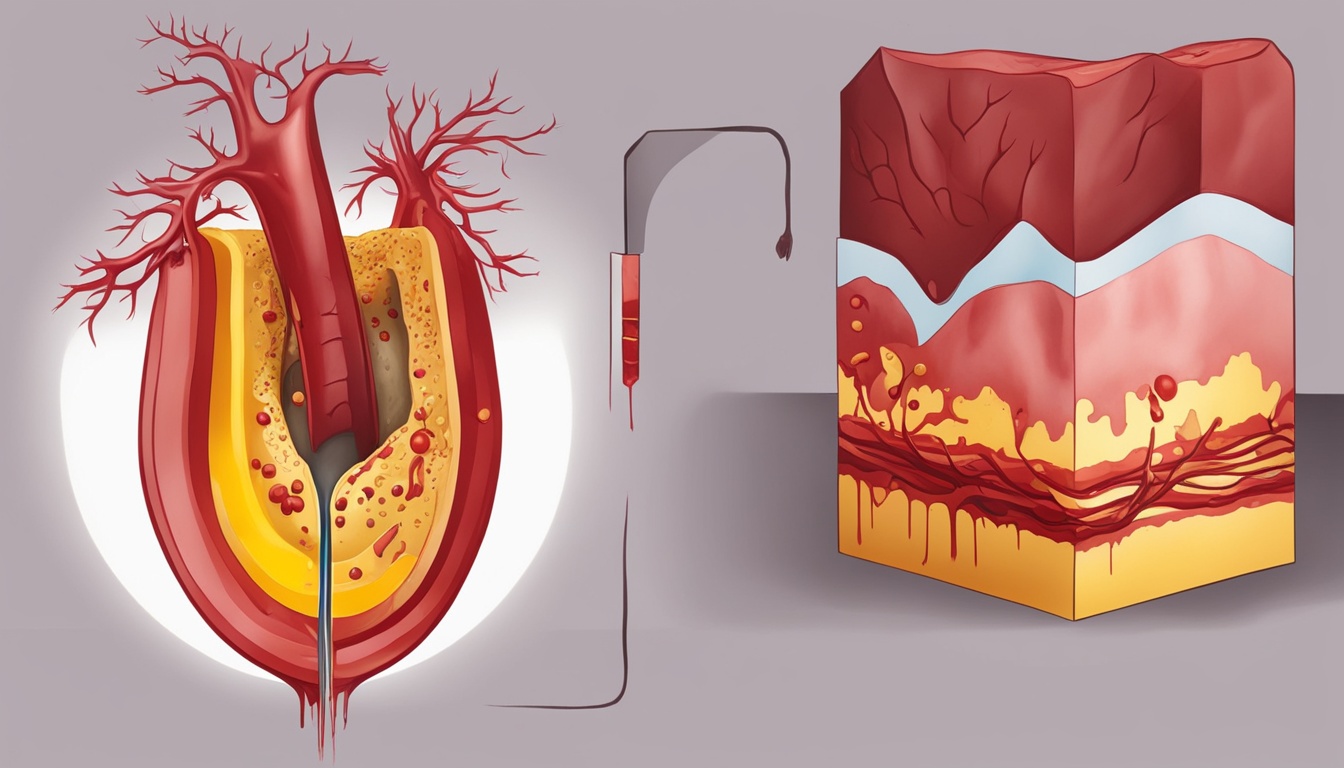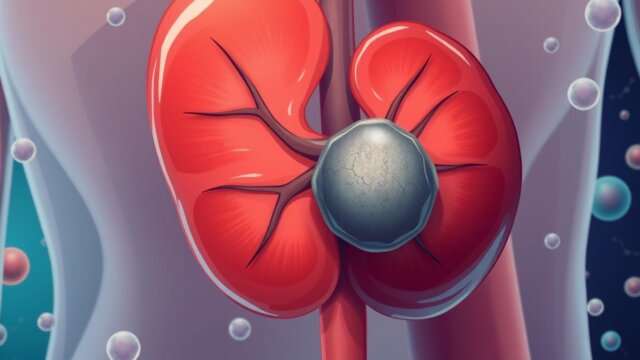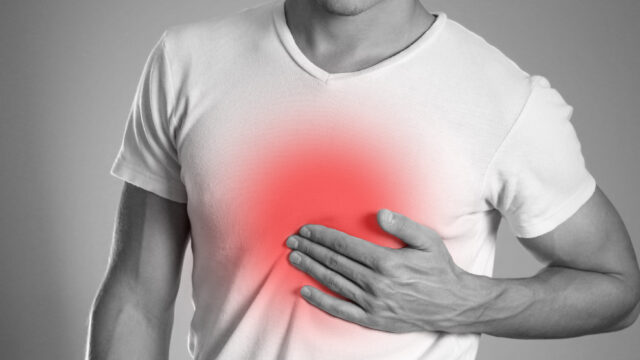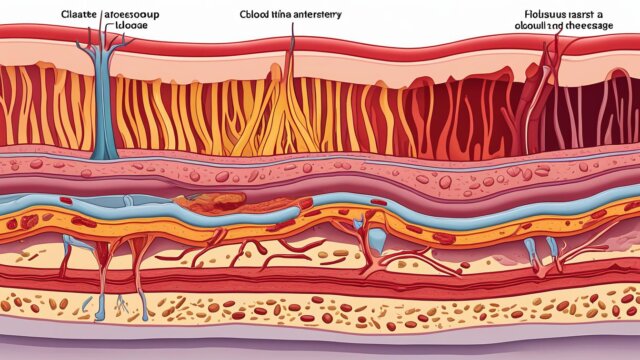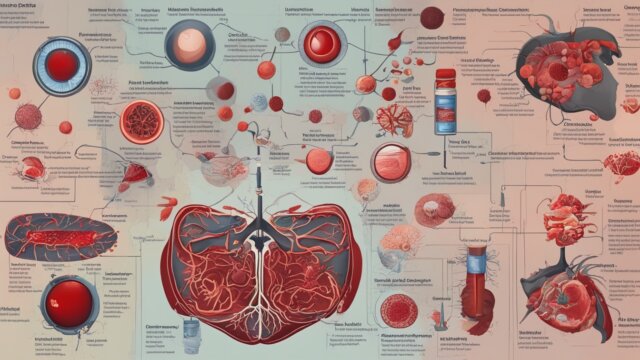FTC disclaimer: This post may contains affiliate links and we will be compensated if you click on a link and make a purchase.
Did you know nearly 94 million U.S. adults aged 20 or older have borderline high cholesterol levels? This fact shows how common a condition that affects your heart health is. High levels of “bad” low-density lipoprotein (LDL) cholesterol can cause fatty deposits in your arteries. These deposits can block blood flow and raise your risk of heart disease and stroke.
Learning about high bad cholesterol is key to taking care of your heart. This guide will cover what causes high LDL levels, the risks, and how to manage it. We’ll look at the factors that raise bad cholesterol, the dangers of not treating it, and ways to lower it.
Key Takeaways
- High cholesterol, especially “bad” LDL cholesterol, raises your risk of heart disease and other serious health issues.
- Unhealthy eating, being inactive, being overweight, and some medical conditions can increase bad cholesterol.
- It’s important to get your cholesterol checked regularly to catch problems early.
- Changing your lifestyle to eat better and exercise can help keep bad cholesterol in check.
- In some cases, you might need medicine to lower LDL levels and protect your heart.
What is Bad Cholesterol?
Cholesterol is a fatty substance in your blood that your body needs. But too much LDL cholesterol (the “bad” kind) can cause plaque to build up in your arteries. This is called atherosclerosis. This can raise your risk of heart disease and stroke.
Understanding LDL and HDL Cholesterol
LDL cholesterol is the “bad” kind because it makes plaque in your arteries. On the other hand, HDL cholesterol (the “good” kind) helps clear out extra cholesterol from your body.
The Role of Triglycerides
Your blood also checks for triglycerides, a type of fat. High triglycerides can up your heart disease risk if you also have low HDL and high LDL cholesterol.
Cholesterol Level | Optimal Range |
|---|---|
LDL Cholesterol | Less than 100 mg/dL |
HDL Cholesterol | More than 60 mg/dL |
Triglycerides | Less than 150 mg/dL |
Causes of High Bad Cholesterol Levels
Your diet and lifestyle choices greatly affect your cholesterol levels. Eating too many saturated and trans fats can increase your LDL (“bad”) cholesterol. Not being active can also hurt your blood cholesterol. Plus, stress and drinking too much alcohol can lower your cholesterol levels.
Unhealthy Diet and Lifestyle Factors
Eating too much saturated and trans fats, and not moving enough, can hurt your cholesterol. Try to keep saturated fats under 10% of your daily calories. Drinking more than two drinks a day for men or one for women can also increase your cholesterol. Not being active is linked to unhealthy cholesterol levels.
Genetic and Medical Conditions
Some genes and health issues can raise your bad cholesterol. Some medicines, like birth control pills, antivirals, and anticonvulsants, can do this too. Conditions like hypothyroidism, type 2 diabetes, and NAFLD can also affect your cholesterol. Genetic factors can make it hard for your body to remove or break down LDL cholesterol.
“Maintaining a healthy lifestyle and managing any underlying medical conditions are crucial for keeping your cholesterol levels in check.”
Risk Factors for Bad Cholesterol
Keeping your cholesterol levels healthy is key for a strong heart. But, many things can make your cholesterol go up. Knowing these can help you lower your heart disease risk.
Getting older can raise your cholesterol. This is more true after you turn 40. Men usually have less good cholesterol than women. Women have less bad cholesterol until they go through menopause.
- Eating too much bad fats and being overweight can up your cholesterol.
- Not moving enough and drinking too much alcohol are also bad for your cholesterol.
- Having a family history of high cholesterol or heart disease ups your risk, especially with FH.
- Conditions like diabetes and high blood pressure can also raise your cholesterol risk.
Knowing the cholesterol risk factors is the first step to better heart health. By changing your lifestyle, getting regular check-ups, and managing health issues, you can keep your cholesterol right. This lowers your heart disease risk.
“Controlling cholesterol is crucial for heart health, but it’s important to understand the various risk factors that can contribute to high levels.” – Dr. Emily Johnson, Cardiologist
Symptoms of High Bad Cholesterol
High bad cholesterol often has no visible signs. It’s different from high blood pressure or diabetes, which have clear symptoms. The first sign might be health issues like heart disease or stroke.
The only way to find out if you have high bad cholesterol is through a blood test. A lipid panel checks your total cholesterol, LDL (bad) cholesterol, HDL (good) cholesterol, and triglycerides. High LDL, low HDL, and high triglycerides raise your risk of heart disease.
High cholesterol itself doesn’t have obvious symptoms. But, not treating it can lead to serious health issues. Arteries can get clogged, making heart attack and stroke more likely. Signs of high cholesterol include yellow skin growths and heart disease symptoms like chest pain.
It’s crucial to get your cholesterol checked regularly, even if you feel fine. Early detection lets you manage it and lower your risk of serious heart problems.
Cholesterol Level | Desirable Range |
|---|---|
Total Cholesterol | Less than 200 mg/dL |
LDL Cholesterol | Less than 100 mg/dL |
HDL Cholesterol | 40 mg/dL or higher |
Triglycerides | Less than 150 mg/dL |
“High cholesterol is easy to diagnose with a blood test called a lipid panel.”
Complications of Untreated Bad Cholesterol
High levels of “bad” LDL cholesterol can harm your heart if ignored. This can cause plaque to form in your arteries, a condition called atherosclerosis. This plaque makes arteries hard and narrow, reducing blood flow.
Atherosclerosis and Plaque Buildup
Over time, plaque in arteries gets worse, raising the risk of coronary artery disease. This can lead to a heart attack if a plaque blocks a coronary artery. High cholesterol can also cause serious problems like stroke and peripheral artery disease.
Coronary Artery Disease and Heart Attacks
More plaque means less blood to your heart, causing coronary artery disease. This raises the chance of a heart attack if arteries block completely, stopping blood to the heart. High cholesterol is a big reason for this dangerous issue.
“High cholesterol triggers inflammation and the release of certain hormones that cause blood vessels to tighten up, leading to high blood pressure.”
It’s important to lower bad cholesterol to avoid these heart problems. Ignoring it can seriously harm your heart health.
Diagnosing Bad Cholesterol Levels
If you’re worried about your bad cholesterol, start with a cholesterol screening test. This test is a simple blood check. It looks at your total cholesterol, LDL (bad) cholesterol, HDL (good) cholesterol, and triglycerides. It gives you a full view of your cholesterol levels and spots any problems.
When to Get Tested
Kids and teens should get their cholesterol checked every 5 years starting at age 9. Adults should get tested every 1-5 years, based on their age and heart disease risk. If you have a family history of high cholesterol or other heart disease risks, you might need more tests to keep an eye on your levels.
Keeping your cholesterol healthy is key for your heart. Knowing your cholesterol numbers and managing them can lower your risk of serious heart problems. Regular cholesterol tests are key to keeping your heart healthy.
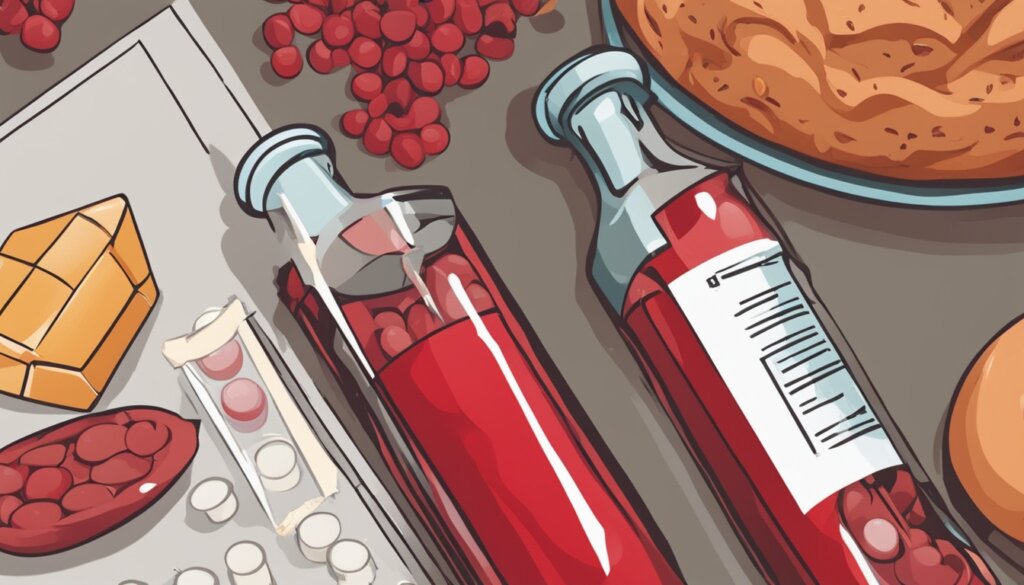
“Cholesterol screening is a simple, painless test that can provide valuable insights into your heart health. Don’t wait until it’s too late – make sure to get your levels checked regularly.”
Preventing High Bad Cholesterol
Smart choices in your life can help prevent high bad cholesterol. Eat foods low in bad fats and high in good ones like fruits and veggies. Also, exercise daily, like walking for 30 minutes, to boost your good cholesterol and keep a healthy weight.
Stop smoking, drink less alcohol, and manage stress to improve your cholesterol and heart health.
Dietary Changes and Exercise
Eat less bad fats to lower bad cholesterol. Cut down on cheese, fatty meats, and tropical oils. Choose lean proteins, seafood, and whole grains instead.
Also, eat foods high in fiber like oatmeal and beans. Foods with healthy fats, like avocados and nuts, can also help.
Exercise is key for keeping cholesterol levels healthy. Adults need 2 hours and 30 minutes of moderate exercise a week. Kids and teens should aim for 1 hour a day.
Keeping a healthy weight helps lower bad cholesterol and reduces heart disease risk.
Lifestyle Modifications
Healthy habits can really help your cholesterol levels. Quitting smoking is a big step towards better heart health. Drinking less alcohol is also good for your heart.
Stress can hurt your cholesterol levels too. Talk to your doctor about any health issues or medicines affecting your cholesterol. Regular check-ups and talking with your doctor are key for managing cholesterol.
| Recommended Guidelines for Cholesterol Prevention |
|---|
|
“Adopting a healthy lifestyle is one of the most effective ways to prevent and manage high cholesterol levels.”
By changing your lifestyle, you can help prevent high cholesterol and reduce heart disease risk.
Treatment Options for Bad Cholesterol
If changing your lifestyle isn’t enough to control bad cholesterol, your doctor might suggest cholesterol-lowering drugs, like statins. Statins stop the liver from making LDL cholesterol. This can really help lower the risk of heart disease. Your doctor might also recommend other drugs, like bile acid sequestrants or fibrates, based on what works best for you. Sometimes, they might suggest lifestyle coaching or monitoring to help manage your cholesterol.
Medications and Therapies
For high cholesterol, doctors might prescribe statins, cholesterol absorption inhibitors, or PCSK9 inhibitors. High triglycerides can be treated with fibrates or omega-3 fatty acid supplements. These treatments can be used alone or with statins. Some people might not like the side effects of these drugs, like muscle pain or memory loss.
Kids over 2 with high cholesterol or obesity start with diet and exercise, and might get statins at 10 or older. Studies show that lowering LDL cholesterol can reduce heart attacks and strokes. Changing your lifestyle can improve lipid levels in 6 to 12 months, but results vary.
- Statins are often prescribed for high blood cholesterol and help prevent heart attacks and strokes.
- Psyllium fiber supplements can help lower lipid levels and reduce medication side effects.
- Low-dose fish oil supplements don’t really help the heart.
- High-dose EPA can lower heart risks when taken with a statin for mild high triglycerides.
- Soy foods like tofu and edamame are good for your heart because of their healthy fats.
“High cholesterol and triglycerides need ongoing treatment, or levels can go back up, raising heart disease risk.”

Cholesterol Levels | Desirable | Borderline High | High |
|---|---|---|---|
Total Cholesterol | Below 200 mg/dL (5.2 mmol/L) | 200-239 mg/dL (5.2-6.2 mmol/L) | 240 mg/dL (6.2 mmol/L) and above |
LDL Cholesterol | Below 70 mg/dL (1.8 mmol/L) | N/A | N/A |
HDL Cholesterol | 60 mg/dL (1.5 mmol/L) and above | Below 40 mg/dL (1.0 mmol/L) for men and below 50 mg/dL (1.3 mmol/L) for women | N/A |
Triglycerides | Below 150 mg/dL (1.7 mmol/L) | 150-199 mg/dL (1.7-2.2 mmol/L) | 200-499 mg/dL (2.3-5.6 mmol/L) |
The National Heart, Lung, and Blood Institute suggests one cholesterol test between ages 9 and 11, with follow-ups every five years. Statins usually don’t have side effects but might increase diabetes risk in those already at high risk. Exercise can help lower bad cholesterol and triglycerides and raise good HDL cholesterol. Losing just 3% to 5% of your body weight can also help improve cholesterol levels in adults who are overweight or obese.
Managing Bad Cholesterol with Other Conditions
High cholesterol often goes hand in hand with other health issues like chronic kidney disease, diabetes, and high blood pressure. Managing your cholesterol well is key, especially with these conditions, as it lowers your risk of heart problems.
Your doctor will look at all your health issues together. They will make sure your cholesterol plan fits your needs. This might mean changing your meds, eating differently, and keeping an eye on your health.
- Studies show that whey protein in dairy can lower bad cholesterol and blood pressure.
- Exercise, like 30 minutes of activity five times a week, can boost the “good” cholesterol.
- Being overweight raises cholesterol levels. Losing weight through diet and exercise can help lower it.
Working with your healthcare team and managing your cholesterol and other conditions well can lower your heart disease risk. It can also improve your health overall.
Condition | Impact on Cholesterol | Management Considerations |
|---|---|---|
Chronic Kidney Disease | Increased risk of high cholesterol and triglycerides | Careful medication management, dietary changes, and monitoring of kidney function |
Diabetes | Elevated LDL cholesterol and low HDL cholesterol | Tight blood sugar control, medication adjustments, and prioritizing heart-healthy eating |
High Blood Pressure | Increased risk of high cholesterol and heart disease | Blood pressure management, cholesterol-lowering medications, and lifestyle modifications |
Managing your cholesterol with other health issues needs a detailed and personal plan. Work with your healthcare provider to make a plan that meets all your needs. This will help you reach your cholesterol goals.
“Proper cholesterol management is crucial when dealing with comorbidities like chronic kidney disease, diabetes, and high blood pressure. A tailored approach addressing all underlying conditions is essential for reducing cardiovascular risks.”
The Role of Genetics in Bad Cholesterol
Did you know genetics can affect your cholesterol levels? Some genes make it hard for your body to remove LDL (bad) cholesterol. This is called familial hypercholesterolemia, a condition passed down through families.
If your family has high cholesterol or heart disease early on, talk to your doctor about your risk. You might need genetic tests to understand your risk of high cholesterol.
There’s a 50% chance of passing on the gene for high cholesterol to your kids if you have it. There are over 1,500 genetic variants that cause high cholesterol, making it complex.
But it’s not just about familial hypercholesterolemia. Genetics also affects obesity, BMI, waist size, and waist-to-hip ratio, all risk factors for high cholesterol. Genetics can even lead to diabetes, another high cholesterol risk.
Lifestyle choices like diet and exercise are key for managing cholesterol. But, your genes matter too. Working with your doctor and knowing your genetic risks can help keep your cholesterol healthy and lower heart disease risk.
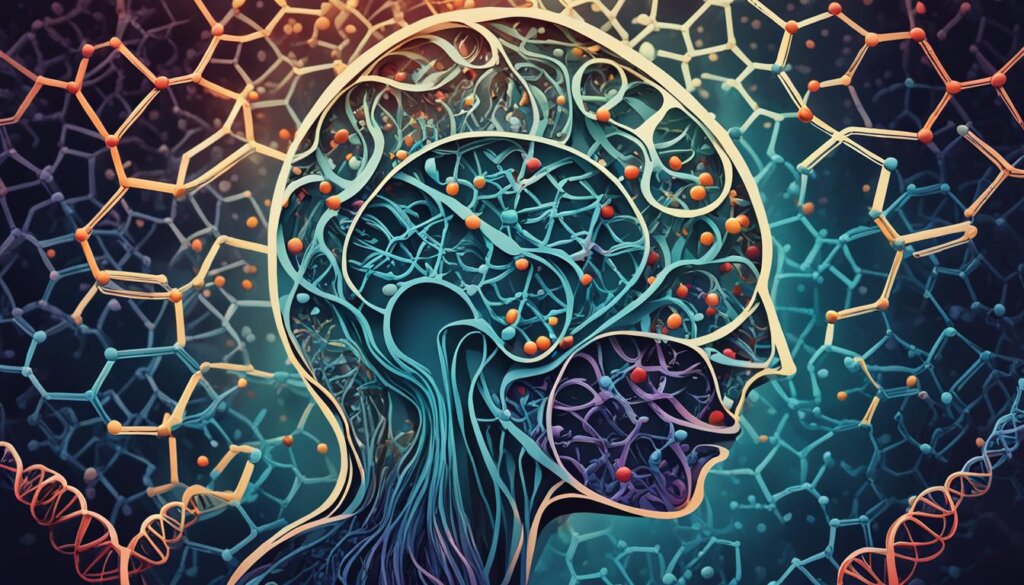
“Genetics can play a significant role in determining your cholesterol levels, and understanding your genetic risk factors is key to managing your heart health.”
Bad Cholesterol and Cardiovascular Health
High levels of bad cholesterol, or low-density lipoprotein (LDL) cholesterol, are a big risk for heart disease. These include coronary artery disease, stroke, and peripheral artery disease. Plaque buildup in your arteries, called atherosclerosis, can block blood flow. This raises the risk of heart attack or stroke.
High cholesterol can also harm your blood vessels outside your heart. It can affect arteries in your legs, arms, and brain. This can lead to other circulatory problems.
Keeping your cholesterol healthy is key for your heart’s health. The National Cholesterol Education Program has guidelines for cholesterol levels. Total cholesterol should be less than 200, 200-239, or 240 and above.
LDL cholesterol levels should be less than 100, 100-129, 130-159, 160-189, or 190 and above. HDL cholesterol, the “good” kind, should be 60 or more. It helps lower heart disease risk.
Things like an unhealthy diet, not exercising, being overweight, and some medical conditions can raise bad cholesterol. But, you can lower LDL and raise HDL with a healthy diet and exercise. Medicines like statins can also help manage high cholesterol and lower heart disease risk.
Understanding bad cholesterol and heart health helps you take steps to stay safe. By managing your cholesterol, you can greatly lower your risk of heart attack and stroke. Your heart’s health is up to you. Taking care of your cholesterol is key to a strong heart.
Myths and Facts about Bad Cholesterol
Many people confuse myths and facts about cholesterol. High cholesterol can hit people much younger than we think, not just the elderly. Also, it’s a myth that high cholesterol shows clear signs. In truth, it can be silent.
It’s key to know the truth and work with your doctor. This way, you’ll understand your cholesterol levels and how to keep your heart healthy. Let’s look at some cholesterol myths and the real cholesterol facts:
- Myth: High cholesterol is only a worry for older people.
- Fact: It can start affecting health in the young, even in kids and teens.
- Myth: High cholesterol always shows signs.
- Fact: Often, it doesn’t show any signs, so regular blood tests are key.
- Myth: A high HDL (good) cholesterol level can fix high LDL (bad) or total cholesterol.
- Fact: A high HDL is good, but it might not be enough to balance out high LDL or total cholesterol.
Knowing the truth about cholesterol misconceptions helps you manage your levels. This keeps your heart in good shape.
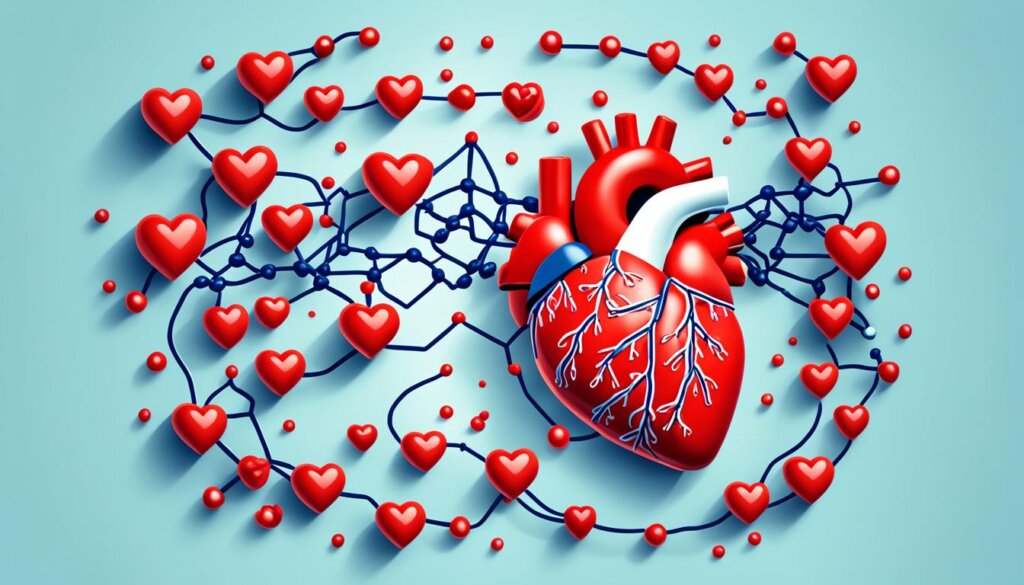
“Separating fact from fiction is crucial when it comes to managing your cholesterol levels and maintaining a healthy heart.”
Conclusion
Keeping your cholesterol levels healthy is key for your heart and overall well-being. High bad cholesterol, or LDL, can lead to plaque buildup in arteries. This increases your risk of heart attacks and strokes. It’s important to manage this risk with lifestyle changes, diet, and sometimes medicine.
Knowing what causes high bad cholesterol helps you lower your risk. Factors include an unhealthy diet, not being active, and genetics. Regular checks of your cholesterol levels are important. They help you keep track of your health and make smart choices about your care. Talking to your doctor is key to finding the best way to manage your cholesterol. This might mean changing your lifestyle, taking medicine, or both.
Cholesterol and heart health is a complex topic, with ongoing research. But keeping your cholesterol in check is crucial. By focusing on managing your cholesterol, you can lower your risk of serious health issues. This helps protect your heart health for the future.
FAQ
What is bad cholesterol?
Bad cholesterol, or low-density lipoprotein (LDL), is a waxy substance in your blood. It can make your arteries clog, raising your risk of heart disease and other heart problems.
What are the main types of cholesterol?
There are two main types of cholesterol. Low-density lipoprotein (LDL) is the “bad” kind. High-density lipoprotein (HDL) is the “good” kind. LDL builds up plaque in arteries, while HDL helps clear out extra cholesterol from your body.
What factors can contribute to high levels of bad cholesterol?
Eating too much saturated and trans fats, not exercising, being overweight, smoking, diabetes, hypothyroidism, and your genes can raise bad cholesterol levels.
What are the risk factors for developing high bad cholesterol?
High bad cholesterol risks include eating poorly, being overweight, not exercising, smoking, drinking too much alcohol, getting older, and having a family history of high cholesterol or heart disease.
Are there any visible symptoms of high bad cholesterol?
High bad cholesterol often has no clear symptoms. The first sign might be health issues like heart disease or stroke. The only way to know is through a blood test.
What are the potential complications of untreated high bad cholesterol?
High bad cholesterol can cause plaque buildup in arteries, known as atherosclerosis. This can block blood flow and increase the risk of heart attacks and other heart problems.
How often should I get my cholesterol levels checked?
Kids and teens should get their cholesterol checked every 5 years starting at age 9. Adults should get tested every 1-5 years, based on their age and health risks. You might need more tests if you have a family history of heart disease.
How can I prevent high levels of bad cholesterol?
To prevent high bad cholesterol, eat a healthy diet low in fats, exercise regularly, keep a healthy weight, and avoid smoking and too much alcohol.
What treatment options are available for high bad cholesterol?
If diet and exercise aren’t enough, your doctor might suggest cholesterol-lowering drugs like statins. You might also get lifestyle advice and regular check-ups.
How does high bad cholesterol affect my overall cardiovascular health?
High bad cholesterol can lead to plaque buildup in arteries, raising your risk of heart disease, heart attacks, and stroke. Keeping your cholesterol in check is key to a healthy heart.
Are there any common myths or misconceptions about high bad cholesterol?
Yes, some think high cholesterol only hits older people and always shows symptoms. It’s vital to know the facts and work with your doctor to manage your cholesterol levels for a healthy heart.
